Accounting Principles and Rules
Added on 2020-10-22
39 Pages4332 Words322 Views
Financial Accounting &
Principles
Principles
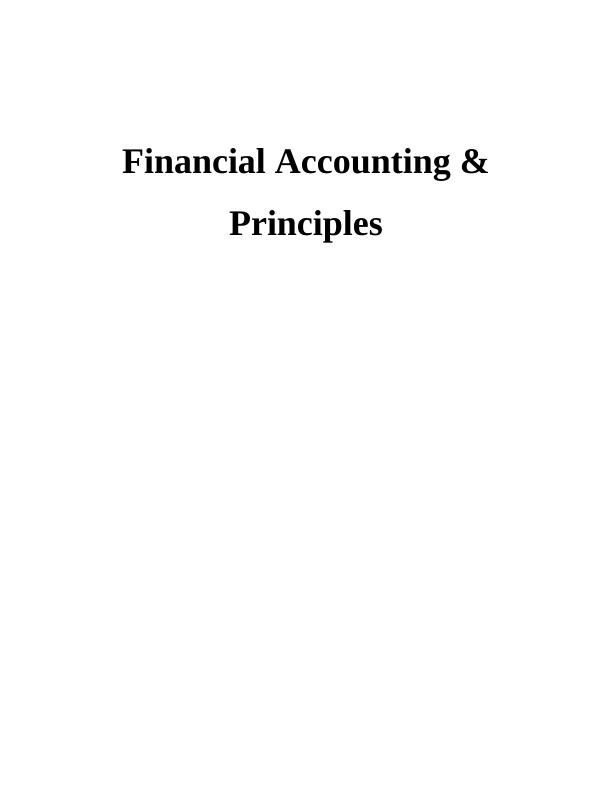
TABLE OF CONTENTS
INTRODUCTION...........................................................................................................................1
A. Report to Line Manager for explaining accounting regulations........................................1
CLIENT 1........................................................................................................................................4
A. Journal entries for Alexandra............................................................................................4
B. Ledger accounts for the firm..............................................................................................8
C. Producing trial balance for business................................................................................18
M1. Purchase and sale transactions from trial balance.........................................................19
D1. Consideration of accounting rules and regulations and constructing trial balance.......19
CLIENT 2......................................................................................................................................19
A. Producing income statement............................................................................................19
B. Preparing balance sheet for the business.........................................................................20
CLIENT 3......................................................................................................................................22
A. Preparing income statement.............................................................................................22
B. Producing balance sheet for the organisation..................................................................23
..............................................................................................................................................25
..............................................................................................................................................28
..............................................................................................................................................28
C. Concepts and principles of accounting............................................................................28
D. Importance of charging depreciation and presenting methods of depreciation...............29
M2. Evaluating balance sheet and cash flow statement and income statement...................29
D2. Accurate computations in accounting............................................................................29
CLIENT 4......................................................................................................................................29
A. Producing bank reconciliation statement.........................................................................29
B. Outlining causes of recording transaction in statement...................................................30
C. Cash books.......................................................................................................................30
..............................................................................................................................................30
M3. Process of reconciliation and accounting terms............................................................31
D3. Bank reconciliation statement.......................................................................................31
CLIENT 5......................................................................................................................................31
INTRODUCTION...........................................................................................................................1
A. Report to Line Manager for explaining accounting regulations........................................1
CLIENT 1........................................................................................................................................4
A. Journal entries for Alexandra............................................................................................4
B. Ledger accounts for the firm..............................................................................................8
C. Producing trial balance for business................................................................................18
M1. Purchase and sale transactions from trial balance.........................................................19
D1. Consideration of accounting rules and regulations and constructing trial balance.......19
CLIENT 2......................................................................................................................................19
A. Producing income statement............................................................................................19
B. Preparing balance sheet for the business.........................................................................20
CLIENT 3......................................................................................................................................22
A. Preparing income statement.............................................................................................22
B. Producing balance sheet for the organisation..................................................................23
..............................................................................................................................................25
..............................................................................................................................................28
..............................................................................................................................................28
C. Concepts and principles of accounting............................................................................28
D. Importance of charging depreciation and presenting methods of depreciation...............29
M2. Evaluating balance sheet and cash flow statement and income statement...................29
D2. Accurate computations in accounting............................................................................29
CLIENT 4......................................................................................................................................29
A. Producing bank reconciliation statement.........................................................................29
B. Outlining causes of recording transaction in statement...................................................30
C. Cash books.......................................................................................................................30
..............................................................................................................................................30
M3. Process of reconciliation and accounting terms............................................................31
D3. Bank reconciliation statement.......................................................................................31
CLIENT 5......................................................................................................................................31
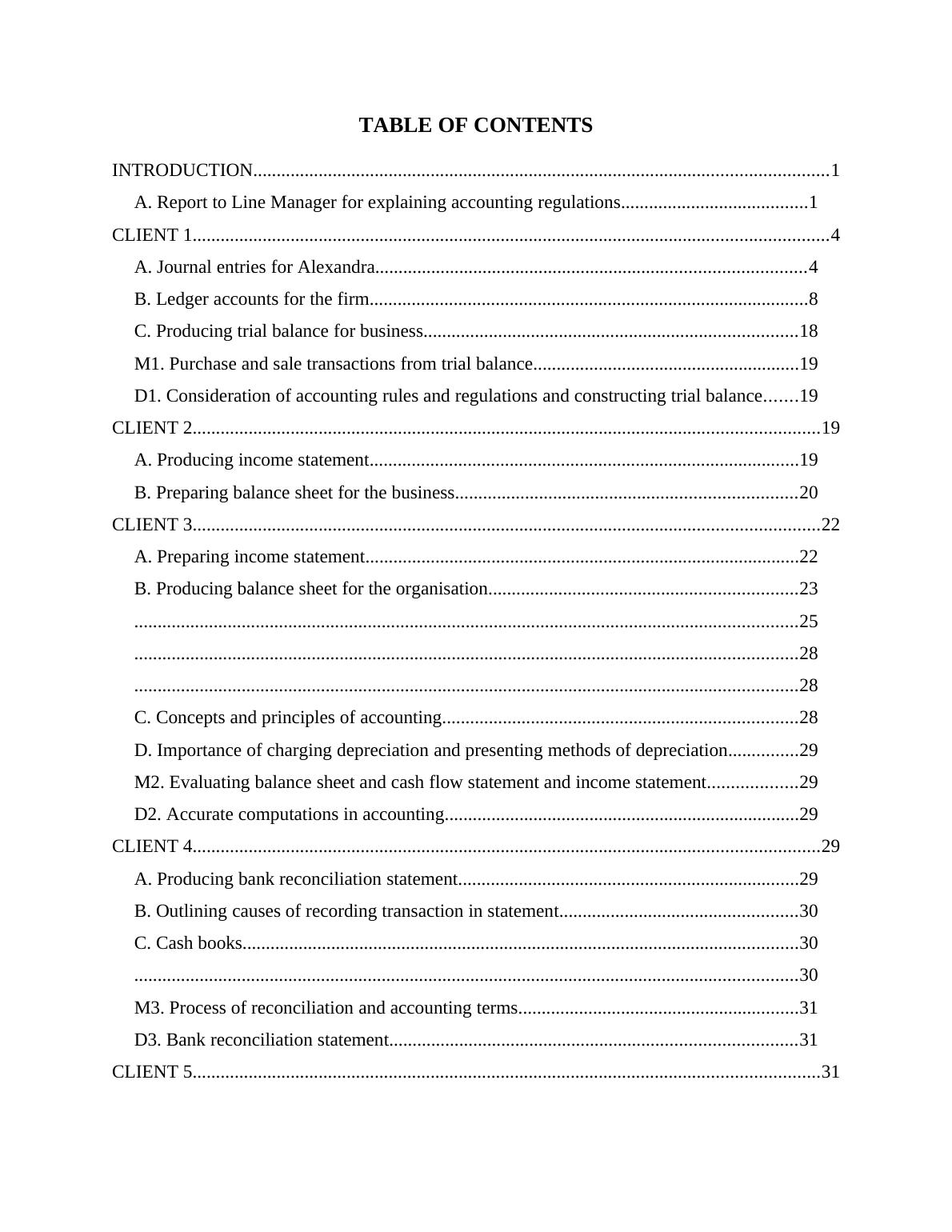
A. Sales and purchase ledger account for the firm...............................................................31
B. Discussion on control account.........................................................................................32
CLIENT 6......................................................................................................................................32
A. Suspense account and discussing features of suspense account......................................32
B. Trial balance for business................................................................................................32
C. Journal entries..................................................................................................................33
D. Difference between clearing and suspense account........................................................33
M4. Types of accounts.........................................................................................................34
D4. Accounting methods for business..................................................................................34
CONCLUSION..............................................................................................................................34
REFERENCES..............................................................................................................................35
B. Discussion on control account.........................................................................................32
CLIENT 6......................................................................................................................................32
A. Suspense account and discussing features of suspense account......................................32
B. Trial balance for business................................................................................................32
C. Journal entries..................................................................................................................33
D. Difference between clearing and suspense account........................................................33
M4. Types of accounts.........................................................................................................34
D4. Accounting methods for business..................................................................................34
CONCLUSION..............................................................................................................................34
REFERENCES..............................................................................................................................35
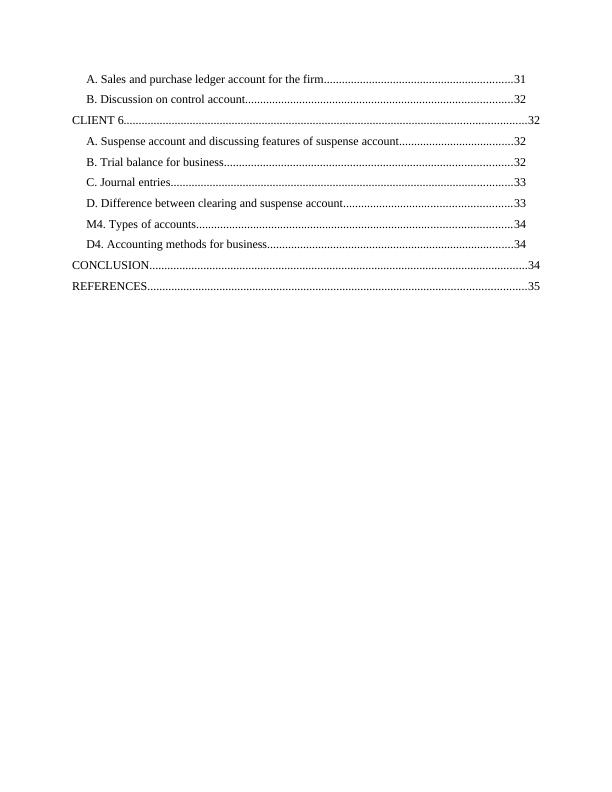
INTRODUCTION
The financial accounting is one of the useful branch of accounting as it helps company to
records monetary transaction occurred on day-to-day basis. Present report deals with importance
of financial accounting in business and as such, problems regarding financials are resolved for
various clients. Furthermore, suspense and control account are discussed. It can be said that
without recording and summarising accounts, business entity cannot prepare financial
statements.
A. Report to Line Manager for explaining accounting regulations
To: Line Manager
From: Junior Accountant
Subject: Accounting regulations, concepts and principles to be considered by firm for injecting
business operations
Respected Sir,
Accounting plays crucial role in the business as day-to-day transactions can be
effectively recorded and summarised data can be taken out with much ease. It is an art of
recording business transactions in accounting books so that each and every information may be
accounted for and serve ultimately for preparation of financial statements in the best possible
manner. It is required in organisation as it provides fruitful information to the management and
external users to take into account information and analyse financials for taking enhanced
decisions. It is essentially needed to be prepared by organisation as without it, final accounts
cannot be formulated in effective way (Beaumont, 2015). The main financial statements in the
business are income statement, balance sheet and cash flow statement which are prepared so
that users of accounting information may be benefited quite effectually.
Balance sheet provides position of business in terms of assets and liabilities for a
particular period. Income statement shows income earned and expenditures incurred in the
company. On the other side, cash flow statement shows cash position in effectual manner. This
is required so that company may be able to prepare financials in the best possible way.
However, for making financials accurate, accounting regulations have to be followed in order to
produce fair statements helping stakeholders in taking better decision regarding profitability
1
The financial accounting is one of the useful branch of accounting as it helps company to
records monetary transaction occurred on day-to-day basis. Present report deals with importance
of financial accounting in business and as such, problems regarding financials are resolved for
various clients. Furthermore, suspense and control account are discussed. It can be said that
without recording and summarising accounts, business entity cannot prepare financial
statements.
A. Report to Line Manager for explaining accounting regulations
To: Line Manager
From: Junior Accountant
Subject: Accounting regulations, concepts and principles to be considered by firm for injecting
business operations
Respected Sir,
Accounting plays crucial role in the business as day-to-day transactions can be
effectively recorded and summarised data can be taken out with much ease. It is an art of
recording business transactions in accounting books so that each and every information may be
accounted for and serve ultimately for preparation of financial statements in the best possible
manner. It is required in organisation as it provides fruitful information to the management and
external users to take into account information and analyse financials for taking enhanced
decisions. It is essentially needed to be prepared by organisation as without it, final accounts
cannot be formulated in effective way (Beaumont, 2015). The main financial statements in the
business are income statement, balance sheet and cash flow statement which are prepared so
that users of accounting information may be benefited quite effectually.
Balance sheet provides position of business in terms of assets and liabilities for a
particular period. Income statement shows income earned and expenditures incurred in the
company. On the other side, cash flow statement shows cash position in effectual manner. This
is required so that company may be able to prepare financials in the best possible way.
However, for making financials accurate, accounting regulations have to be followed in order to
produce fair statements helping stakeholders in taking better decision regarding profitability
1
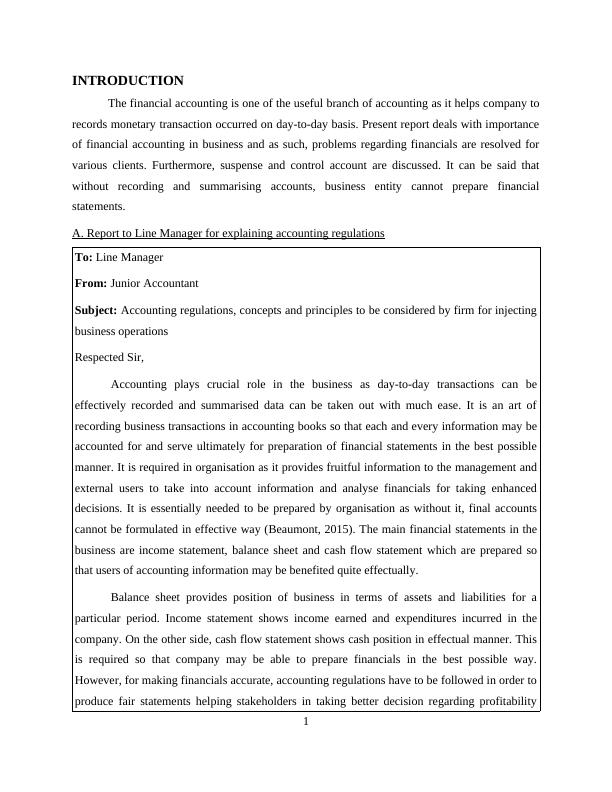
aspect of company. The accounting principles and regulations are required to be followed, if
organisation do not follow the same, then true position cannot be provided to users. False
information will be imparted to them affecting their decision-making.
By complying with regulations, creditors, investors and other external parties are
benefited up to a high extent. Creditors' analyses solvency and liquidity position of company as
they provide loans on stated terms and conditions. While, investors' are benefited by assessing
profitability aspect of the firm. Hence, it can be said that organisation is required to be abide by
laws and regulations so that it may impart appropriate and true financial statements highlighting
overall performance (Klychova and et.al, 2015).
Explaining meaning of Financial Accounting
The financial accounting is termed as gathering past data and then preparing financial
statements quite effectually. It is the base for producing financials because accounting records
are taken in and then statements are prepared with much ease. All monetary transactions that
occurs in the business is accounted for and as such, firm is able to prepare financials in effective
way. In simple words, financial accounting is summarising, analysing and then reporting of
transactions which pertains to organisation. Hence, they are then provided to stakeholders for
taking better decisions quite effectively. The financial reports are prepared which then given to
external parties serving them needed information highlighting efficiency, profitability, liquidity
and solvency position in the best possible manner.
The financial accounting deals with preparation of journal entries which are recorded on
daily basis in chronological order. From this, entries are posted in general ledger accounts.
After this, trial balance to check over any mathematical errors might have occurred in posting
transactions in ledger from journal (Nash, 2018). Hence, afterwards, balance sheet, cash flow
statement and income statement are prepared. Thus, financial accounting implies useful
information regarding business operations and as a result, internal and external parties are able
to take decisions.
Discussing Financial Accounting Regulations
The regulations are important to be taken into account so that authenticated financials
may be prepared with ease. Accounting professional bodies have imparted legal frameworks
2
organisation do not follow the same, then true position cannot be provided to users. False
information will be imparted to them affecting their decision-making.
By complying with regulations, creditors, investors and other external parties are
benefited up to a high extent. Creditors' analyses solvency and liquidity position of company as
they provide loans on stated terms and conditions. While, investors' are benefited by assessing
profitability aspect of the firm. Hence, it can be said that organisation is required to be abide by
laws and regulations so that it may impart appropriate and true financial statements highlighting
overall performance (Klychova and et.al, 2015).
Explaining meaning of Financial Accounting
The financial accounting is termed as gathering past data and then preparing financial
statements quite effectually. It is the base for producing financials because accounting records
are taken in and then statements are prepared with much ease. All monetary transactions that
occurs in the business is accounted for and as such, firm is able to prepare financials in effective
way. In simple words, financial accounting is summarising, analysing and then reporting of
transactions which pertains to organisation. Hence, they are then provided to stakeholders for
taking better decisions quite effectively. The financial reports are prepared which then given to
external parties serving them needed information highlighting efficiency, profitability, liquidity
and solvency position in the best possible manner.
The financial accounting deals with preparation of journal entries which are recorded on
daily basis in chronological order. From this, entries are posted in general ledger accounts.
After this, trial balance to check over any mathematical errors might have occurred in posting
transactions in ledger from journal (Nash, 2018). Hence, afterwards, balance sheet, cash flow
statement and income statement are prepared. Thus, financial accounting implies useful
information regarding business operations and as a result, internal and external parties are able
to take decisions.
Discussing Financial Accounting Regulations
The regulations are important to be taken into account so that authenticated financials
may be prepared with ease. Accounting professional bodies have imparted legal frameworks
2
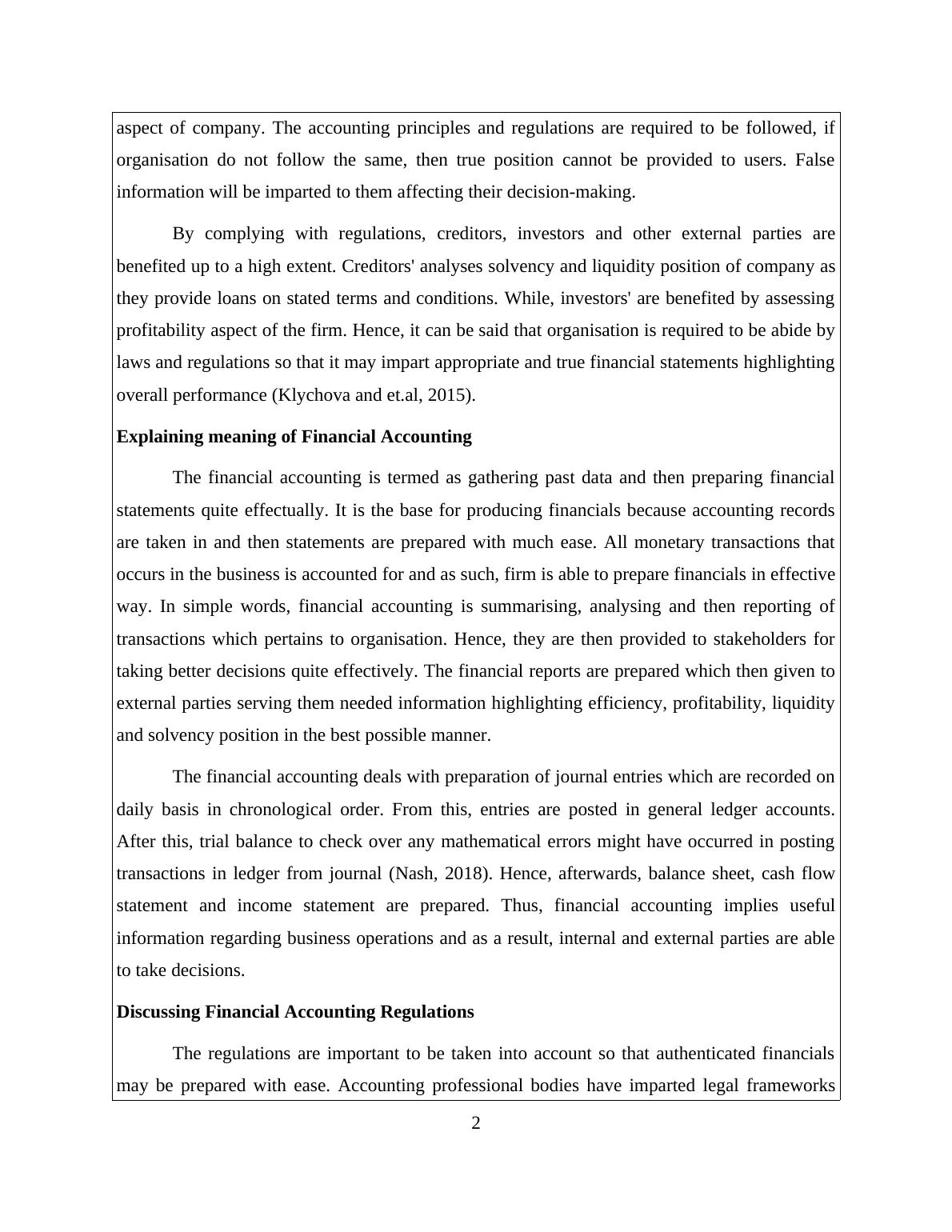
which are to be followed by accountants in order to construct accurate financial statements
highlighting fair and true position of company quite effectually. In relation to this, UK
corporate and government regulatory, FRC has given guidelines regarding preparation of final
accounts. This will be helpful for external parties as they rely on such statements and take
decisions thereof. If accounts are manipulated, then financials will not provide fair view of
business (Goh, Li Ng and Yong, 2015). Hence, to eradicate manipulation in final accounts, it is
required to follow guidelines of professional bodies. The legal guidelines or frameworks are
listed as under-
IFRS (International Financial Reporting Standards)- The body provides effective guidelines
to accountants so that they may prepare financial reports in accordance to prescribed forma. It is
then imparted to the stakeholder for assessing and take decisions.
IASB (International Accounting Standards Board)- It is another body which highlights
various standards of financial accounting by which information can be presented in proper
manner to the stakeholders. Furthermore, true view regarding financials is imparted to external
parties.
FRC (Financial Reporting Council)- It is a body limited by guarantee and regulates
government departments and corporate sector as well. Aim of FRC is to promote investment in
UK and as a result, entire country is benefited up to a high extent.
Accounting rules
The accounting rules are imparted by GAAP (Generally Accepted Accounting
Principles) which is another vital body governing accountants in effective manner. The
accounting rules provided by the body are as follows-
Economic assumption- The accounting rule states that economic environment is assessed by the
company and then, assumption are implemented. These assumptions are made in order to find
out how it will impact on business operations or on upcoming project (Busco and Quattrone,
2018).
Principle of full disclosure- All the monetary transactions should be taken into account so that
business may prepare appropriate financial statements. For attaining transparency, all
3
highlighting fair and true position of company quite effectually. In relation to this, UK
corporate and government regulatory, FRC has given guidelines regarding preparation of final
accounts. This will be helpful for external parties as they rely on such statements and take
decisions thereof. If accounts are manipulated, then financials will not provide fair view of
business (Goh, Li Ng and Yong, 2015). Hence, to eradicate manipulation in final accounts, it is
required to follow guidelines of professional bodies. The legal guidelines or frameworks are
listed as under-
IFRS (International Financial Reporting Standards)- The body provides effective guidelines
to accountants so that they may prepare financial reports in accordance to prescribed forma. It is
then imparted to the stakeholder for assessing and take decisions.
IASB (International Accounting Standards Board)- It is another body which highlights
various standards of financial accounting by which information can be presented in proper
manner to the stakeholders. Furthermore, true view regarding financials is imparted to external
parties.
FRC (Financial Reporting Council)- It is a body limited by guarantee and regulates
government departments and corporate sector as well. Aim of FRC is to promote investment in
UK and as a result, entire country is benefited up to a high extent.
Accounting rules
The accounting rules are imparted by GAAP (Generally Accepted Accounting
Principles) which is another vital body governing accountants in effective manner. The
accounting rules provided by the body are as follows-
Economic assumption- The accounting rule states that economic environment is assessed by the
company and then, assumption are implemented. These assumptions are made in order to find
out how it will impact on business operations or on upcoming project (Busco and Quattrone,
2018).
Principle of full disclosure- All the monetary transactions should be taken into account so that
business may prepare appropriate financial statements. For attaining transparency, all
3
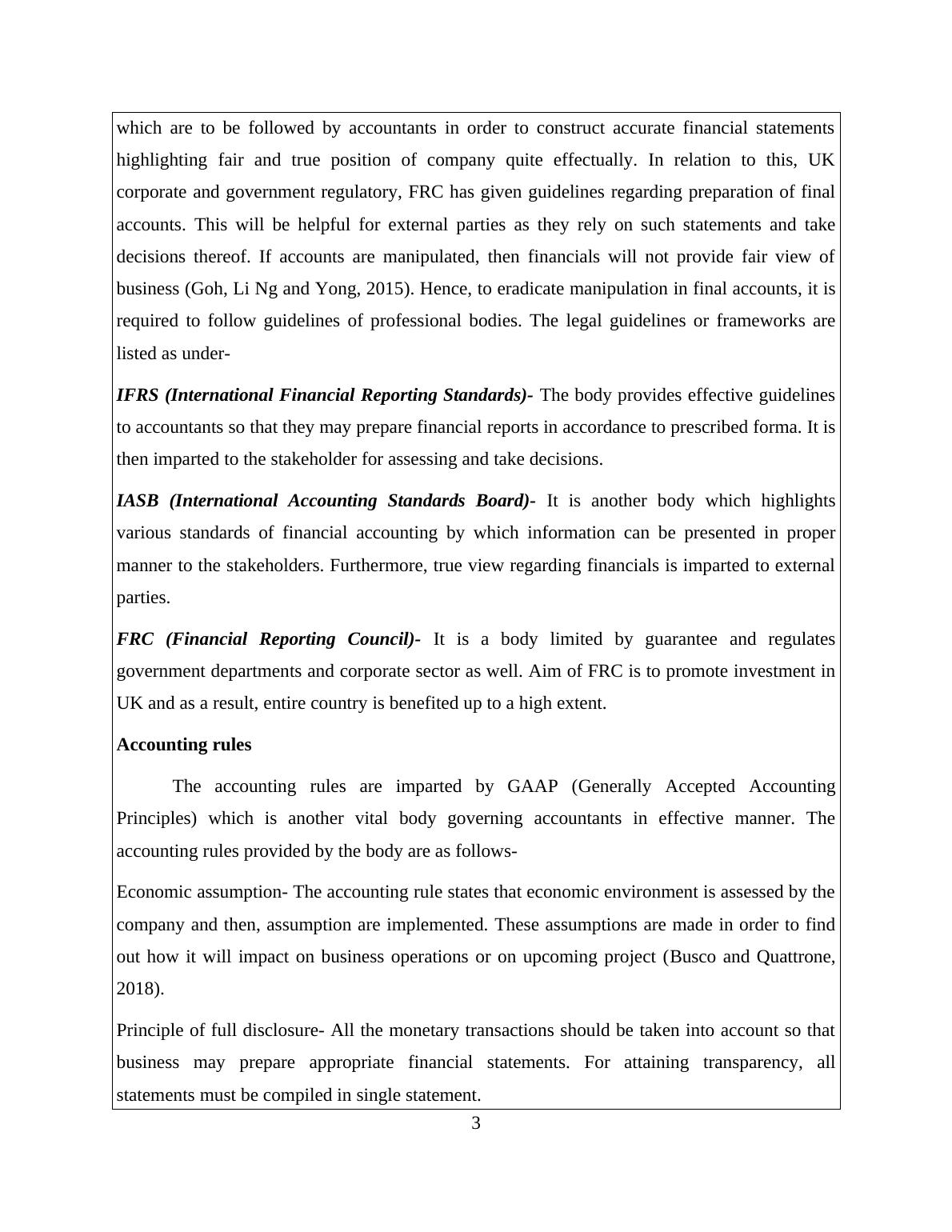
statements must be compiled in single statement.
Going concern concept- The business prepares financials on the basis of going concern
principle. It is assumed that organisation will continue operations for longer period and will not
wind up in short run. Hence, financial statements are produced with much ease.
Materiality concept- This concept states that business should take into consideration only
material items which has impact over financials. This means that immaterial items can be
ignored if they do not serve as the purpose of taking decisions by stakeholders.
Monetary unit assumption- This rule is based on currency value. It assumes that business
transactions may be made in universally acceptable currency. In relation to this, US Dollar is
acceptable currency in worldwide (Damodaran, 2016).
Concepts of Material Disclosure and Consistency
Material Disclosure- The accounting concept postulates that organisation should include only
those items in the financials which affects decision-making of external users up to a high extent.
It can be analysed that immaterial items should be ignored which does not influence decision by
stakeholders. Hence, such items must be forego in preparing financials in effective way.
Consistency- This concept states that accounting policies should be followed consistently for
years in order to gain reliability in the best possible manner. It implies that organisation follows
particular method in current year, then same should be followed in consecutive coming years.
This will impart reliable results in effective way. For example, if written down value method of
depreciation is implemented, then same should be used for charging depreciation in
forthcoming years to maintain reliability.
CLIENT 1
A. Journal entries for Alexandra
The journal entry is the basic or first step in preparation of financials quite effectually. It
is also termed as books of original or prime entry as transactions are recorded on day-to-day
basis. In simple words, all monetary transactions occurring in the business is recorded in journal
so that clarity may be attained regarding financial receipts and withdrawals in effectual way. The
main essence of journal is that entries are recorded as per chronological order as when they
4
Going concern concept- The business prepares financials on the basis of going concern
principle. It is assumed that organisation will continue operations for longer period and will not
wind up in short run. Hence, financial statements are produced with much ease.
Materiality concept- This concept states that business should take into consideration only
material items which has impact over financials. This means that immaterial items can be
ignored if they do not serve as the purpose of taking decisions by stakeholders.
Monetary unit assumption- This rule is based on currency value. It assumes that business
transactions may be made in universally acceptable currency. In relation to this, US Dollar is
acceptable currency in worldwide (Damodaran, 2016).
Concepts of Material Disclosure and Consistency
Material Disclosure- The accounting concept postulates that organisation should include only
those items in the financials which affects decision-making of external users up to a high extent.
It can be analysed that immaterial items should be ignored which does not influence decision by
stakeholders. Hence, such items must be forego in preparing financials in effective way.
Consistency- This concept states that accounting policies should be followed consistently for
years in order to gain reliability in the best possible manner. It implies that organisation follows
particular method in current year, then same should be followed in consecutive coming years.
This will impart reliable results in effective way. For example, if written down value method of
depreciation is implemented, then same should be used for charging depreciation in
forthcoming years to maintain reliability.
CLIENT 1
A. Journal entries for Alexandra
The journal entry is the basic or first step in preparation of financials quite effectually. It
is also termed as books of original or prime entry as transactions are recorded on day-to-day
basis. In simple words, all monetary transactions occurring in the business is recorded in journal
so that clarity may be attained regarding financial receipts and withdrawals in effectual way. The
main essence of journal is that entries are recorded as per chronological order as when they
4
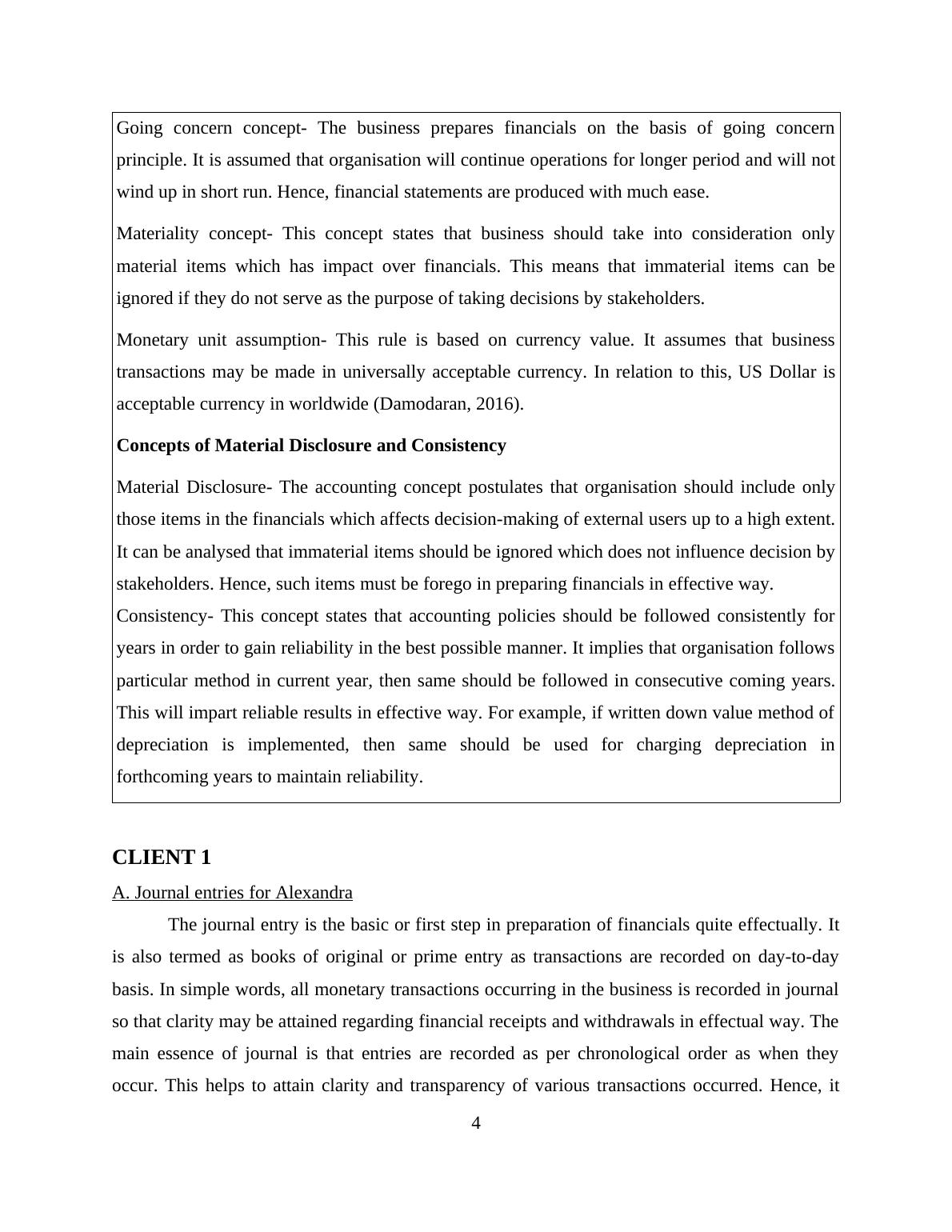
occur. This helps to attain clarity and transparency of various transactions occurred. Hence, it
serves main purpose for general ledger accounts and further statements can be prepared with the
help of journal entries. These are made for Alexandra below-
5
serves main purpose for general ledger accounts and further statements can be prepared with the
help of journal entries. These are made for Alexandra below-
5
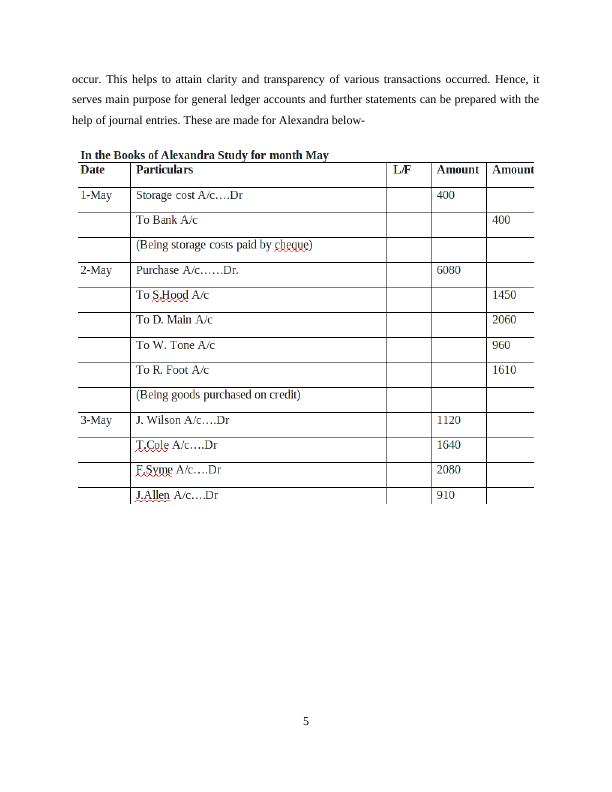
End of preview
Want to access all the pages? Upload your documents or become a member.
Related Documents
Assignment on Financial Accounting pdflg...
|47
|5713
|177
Financial Accounting & Principles Assignmentlg...
|37
|2902
|88
Importance of Accounting in Preparation of Financial Statements - Reportlg...
|34
|4240
|26
Financial Accounting Principles: Assignmentlg...
|40
|3645
|142
Financial Accounting Principles and Conceptslg...
|38
|3915
|73
Financial Accounting & Reporting - DOClg...
|37
|3749
|61
